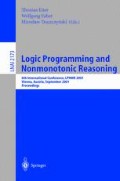Abstract
This work concerns the use of default knowledge in concept learning from positive and negative examples. Two connectives are added to a description logics, C-CLASSIC, previously defined for concept learning. The new connectives (δ and ∈) allow to express the idea that some properties of a given concept definition are default properties, and that some properties that should belong to the concept definition actually do not (these are excepted properties). When performing concept learning both hypotheses and examples are expressed in this new description logics but prior to learning, a saturation process using default and non default rules has to be applied to the examples in order to add default and excepted properties to their definition. As in the original C-CLASSIC, disjunctive learning is performed using a standard greedy set covering algorithm whose generalization operator is the Least Common Subsumer operator of C-CLASSIC δ∈. We exemplify concept learning using default knowledge in this framework and show that explicitly expressing default knowledge may result in simpler concept definitions.
Access this chapter
Tax calculation will be finalised at checkout
Purchases are for personal use only
Preview
Unable to display preview. Download preview PDF.
References
M. Bain and S. Muggleton, ‘Non-monotonic learning’, in Knowledge Representation and Organization in Machine Learning, ed., Stephen Muggleton, 289–319, ACADEMIC PRESS LIMITED, (1992). 174
A. Borgida and P. F. Patel-Schneider, ‘Complete algorithm for subsumption in the CLASSIC description logic‘, Artificial Intelligence Research, 1, 278–308, (1994). 175
R. J. Brachman, ‘A structuralpa radigm for representing knowledge’, Technical Report 3605, BBN Report, (1978). 175
W. Buntine, ‘Generalized subsumption and its application to induction and redundancy’, Artificial Intelligence, 36, (1988). 177
W. W. Cohen, A. Borgida, and H. Hirsh, ‘Computing least common subsumers in description logics’, in 10th National Conference of the American Association for Artificial Intelligence, pp. 754–760, San Jose, California, (1992). 177
W. W. Cohen and H. Hirsh, ‘The learnability of description logics with equality constraints’, Machine Learning, 2(4), 169–199, (1994). 175, 178
W. W. Cohen and H. Hirsh, ‘Learning the CLASSIC description logic: theoretical and experimentalresu lts’, in International Conference on Knowledge Representation and Reasoning, 121–133, (1994). 173, 175, 178
P. Coupey and C. Fouqueré, ‘Extending conceptual definitions with default knowledge’, Computational Intelligence, 13(2), (1997). 175
Y. Dimopoulos and A. Kakas, ‘Learning non-monotonic logic programs: learning exceptions’, in Proceedings of the 11th European Conference on Artificial Intelligence, 1995, ed., Springer-Verlag, pp. 107–121, (1995). 174, 183
Y. Dimopoulos and A. Kakas, ‘Abduction and inductive learning’, in Advances in Inductive Logic Programming, ed., L. De Raedt, pp. 144–171, (1996). 183
F. M. Donini, M. Lenzerini, D. Nardi, and W. Nutt, ‘The complexity of concept languages’, in Principles of Knowledge Representation and Reasoning: 2nd International Conference, eds., J. A. Allen R. Fikes and E Sandewall, pp. 151–162, Cambridge, Mass., (1991). 174
J. Doyle and R. S. Patil, ‘Two theses of knowledge representation: language restrictions, taxonomic classification, and the utility of representation services’, Artificial Intelligence, 48(3), 261–297, (1991). 175
K. Inoue and C. Sakama, ‘Abducing priorities to derive intended conclusions’, in 16th International Joint Conference on Artificial Intelligence, pp. 44–49, Japan, (1999). 183
J. U. Kietz and K. Morik, ‘A polynomial approach to the constructive induction of structuralk nowledge’, Machine Learning, 14(2), 193–217, (1994). 175
S. Muggleton, ‘Inductive logic programming’, New Generation Computing, 8, 295–318, (1991). 173
S. Muggleton and C. Feng, ‘Efficient induction of logic programs’, in Inductive Logic programming, ACADEMIC PRESS, (1992). 178
S. Muggleton and L. De Raedt, ‘Inductive logic programming: Theory and methods’, Journal of Logic Programming, 19, (1994). 173
J. Quantz, G. Dunker, F. Bergmann, and I. Kellner, ‘The flex system’, Technical report, KIT-Report, Technische Universität, Berlin, Germany, (1996). 175
J. Quantz and V. Royer, ‘A preference semantics for defaults in terminological logics’, in Principles of Knowledge Representation and Reasoning: 3rd International Conference, 294–305, Bernhard Nebel, Charles Rich and William Swartout, Cambridge, MA., USA, (1992). 184
J. R. Wright, E. S. Weixelbaum, K. Brown, G. T. Vesonder, S. R. Palmer, J. I. Berman, and H. H. Moore, ‘A knowledge-based configurator that supports sales, engineering and manufacturing at att bell network systems’, in Proceedings of the Innovative Applications of Artificial Intelligence Conferences, pp. 183–193, Menlo Park, California, USA, (1993). 175
V. Ventos, P. Brézellec, P. Coupey, and H. Soldano, ‘C-classicσ∈: un langage de descriptions pac-learnable’, in Actes Journées Acquisition Validation Apprentissage, JAVA95, pp. 192–196, Grenoble, France, (1995). 174, 179
V. Ventos, ‘A deductive study of c-classicσ∈’, in Proceedings of the International Workshop in Description Logics 96, pp. 192–196, Boston, USA, (1996). 174, 177
V. Ventos, C-CLASSICσ∈: une logique de descriptions pour la définition et l’apprentissage de concepts avec défauts et exceptions, PhD thesis, France, 1997. 174, 177, 179, 180, 181
V. Ventos, P. Brézellec, P. Coupey, and H. Soldano, ‘Lcs operation in c-classicσ∈: formalp roperties and applications’, in International KRUSE Symposium Knowledge Retrieval, Use, and Storage for Efficiency, pp. 124–135, Vancouver, Canada, (1997). 177
V. Ventos, P. Brézellec, H. Soldano, and D. Bouthinon ‘Learning concepts in c-classicσ∈’, in Proceedings of the International Workshop on Description Logics 98, pp. 50–54, Trento, Italy, (1998). 174
Author information
Authors and Affiliations
Editor information
Editors and Affiliations
Rights and permissions
Copyright information
© 2001 Springer-Verlag Berlin Heidelberg
About this paper
Cite this paper
Ventos, V., Brézellec, P., Soldano, H. (2001). Explicity Using Default Knowledge in Concept Learning: An Extended Description Logics Plus Strict and Default Rules. In: Eiter, T., Faber, W., Truszczyński, M.l. (eds) Logic Programming and Nonmotonic Reasoning. LPNMR 2001. Lecture Notes in Computer Science(), vol 2173. Springer, Berlin, Heidelberg. https://doi.org/10.1007/3-540-45402-0_13
Download citation
DOI: https://doi.org/10.1007/3-540-45402-0_13
Published:
Publisher Name: Springer, Berlin, Heidelberg
Print ISBN: 978-3-540-42593-9
Online ISBN: 978-3-540-45402-1
eBook Packages: Springer Book Archive

